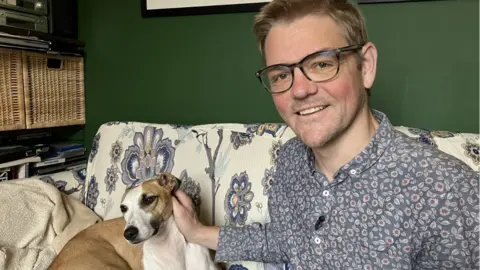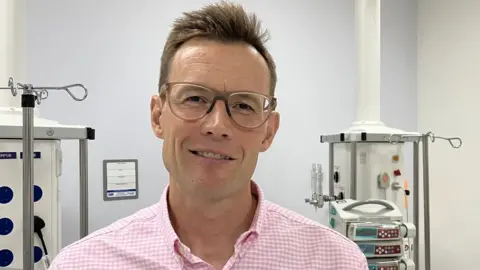 BBC
BBCA double lung transplant recipient says he is “forever grateful” to his donor and his family.
Douglas Forbes, from Cheltenham, was diagnosed with cystic fibrosis when he was 18 months old.
The 41-year-old underwent a transplant in 2013 after his symptoms gradually worsened and he required oxygen 24 hours a day.
“I wouldn't be here if it weren't for the lungs that my donor and his family gave me,” Forbes said.
At age 31, he was placed on the transplant list and waited an “anxious” three months before a match.
“It was either a transplant or the end of my life. Without that prospect, I was watching myself fade into nothingness.
“I wouldn't have been able to see my son's birth, I wouldn't have been able to be a part of my family, I wouldn't have been able to be with my friends, I wouldn't have been able to work… Without that, I simply wouldn't be here. There wouldn’t have been.’ Generosity,” Forbes said.

What is cystic fibrosis?
Cystic fibrosis is an inherited disease that causes sticky mucus to build up in the lungs and digestive system.
It can cause lung infections and problems digesting food.
Symptoms usually begin in early childhood and vary from person to person, but the condition gradually worsens over time, causing more damage to the lungs and digestive system.
There is no cure for this condition, but various treatments can help control symptoms and reduce complications.

Mr. Forbes continued: “During such a difficult time, my donor's family has had to make difficult choices.
“Having the courage to make that decision was amazing and I can't explain how grateful I am.”
This is one of the highest figures in the UK, yet around 150,000 people still have not made their choice.
Dr Mark Haslam, clinical director at Cheltenham General Hospital, said the challenge was to maintain the number of consents for donations.

“The need remains very high. There are 7,000 people on waiting lists in the UK and someone dies every day waiting for a transplant.
“One person can save up to nine lives,” he said.
He further explained that only around 1% of people who die in the UK are eligible to donate their organs, so careful consideration is always taken.
“The patient has to be on a ventilator and basically die in the intensive care unit.
“We always respect the decisions made by our patients,” he said.




